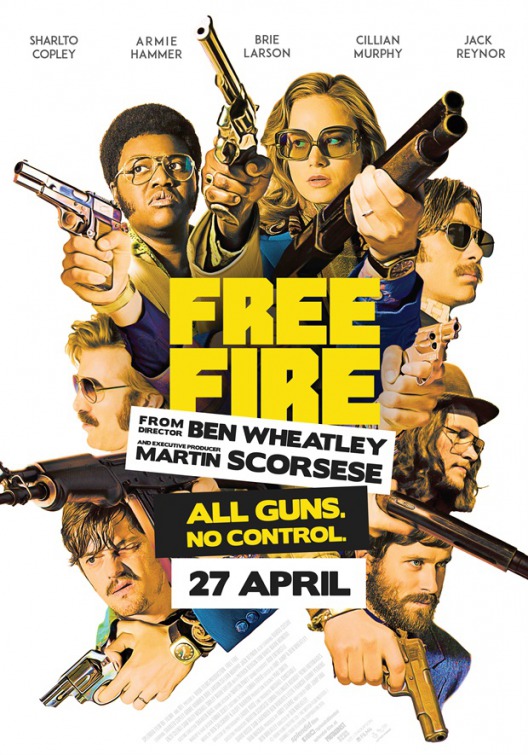All Guns. No Control.
Director
Ben Wheatley
Starring
Cillian Murphy
Michael Smiley
Brie Larson
Armie Hammer
Sharlto Copley
Sam Riley
Jack Reynor
Set at some point in the 1970’s, Free Fire is the story of a South African criminal, Vernon [Copley] selling guns to Irish criminals Chris [Murphy] and Frank [Smiley]. During the course of the purchase, Frank’s drug-addled brother-in-law Stevo [Riley] resumes an altercation from the previous night with Vernon’s associate Harry [Reynor] and everything escalates wildly from there. That, in a nutshell, is the story and yet there is such a wealth of entertainment to be had from this simple premise.
Similarly to films like Reservoir Dogs, Rashomon, Panic Room and The Descent, a certain amount of complexity is cultivated from the minimalist story and small handful of settings. The prime difference in this case is the use of humour as a method to unfurl the story, rather than a pending threat or quirky narrative device. In that sense the general developments feel somewhat akin to a stage production but Free Fire utilises the cinematic medium to its fullest potential; much in the same way that Martin McDonagh did with In Bruges. Unless the story was completely wrapped up in twists and turns, keeping the audience guessing (or distracted, depending on your opinion), a certain amount of personality needs to run throughout. Free Fire is hardly devoid of developmental shifts but they remain relevant and are primarily used as a tool to escalate or warp the humour. In lesser hands, this story could easily outstay its welcome but proves itself inventive enough to retain its freshness through a combination of interesting direction, impressive camera work and an extreme injection of charisma on the part of the cast.
In addition to the energetic script, the performances sell the film; specifically the charm on display. If Harry’s accusations are to be believed, Stevo is a deplorable individual but Riley’s performance ensures a certain amount of endearment. In the same way, Armie Hammer plays the role of Ord, a self-interested party mediating the exchange. Ord is a contemptible arrogant sod whose investment is purely fiscal and yet Hammer’s portrayal is delightful to the degree that you end up rooting for him. This does create an interesting dilemma. The film establishes this gathering of largely deceitful ne’er do wells who display just the right amount of silliness and energy that you want to see more from them but as the plot progresses and the death count needs to rise, we actively encourage and wish for their deaths. It’s a quandary that the last episode of The Sopranos highlighted: introducing us to characters that we like because we invested the time and proximity to them, despite the fact they are awful human beings but when the story gears toward an eventual execution, we feverishly crave it and feel outraged if this demand is not sated.
In addition to the heightened silliness of the characters, there is a combination of absurdity and realism to the action sequences – depending on how best they service the plot. All too often our “heroes” poke their heads above improvised cover and let off a few rounds of ammunition, triggering a flurry of ricochets and renegade debris. Alternatively, some of the bullets hit their target but not enough to put them down for good. Cinema is full of the one-hit kill in terms of fights involving, guns, knives or even fists. In truth, people die slowly and a punch to the face doesn’t immediately knock someone out. Curiously, this takes away from the immediate danger of the situation and creates an amusing setting for seemingly consequence free violence; like paintball. On a deeper level, one could argue there is a degree of irreversible posturing that escalates exponentially, making Free Fire an analysis of the catalyst that sparked World War I; or indeed most military encounters.
Aside from the performances, the film deserves a decent amount of credit when it comes to the quality of the technical aspects and production design. The warehouse itself is such an integral part of the story that the continuity must have been a nightmare and yet it allows for plenty of evolution in the on-going fire fight while remaining recognisable and familiar; ensuring that at no point is the audience confused by where events are taking place. Additionally, the costume work is brilliant. Too many films set decades ago commit the aesthetic sin of replicating the era to a degree. The Wolf Of Wall Street, for example, felt 80s to a point but the fashion, hair, make-up and accessories never explored the more extravagant styles. Free Fire does the opposite and resurrects styles and looks that are immediately associated with the period, regardless of how flattering they may or may not be; gotta be honest, I’m primarily thinking of Jack Reynor’s look. Another two aspects on fine form are the amazing sound design and the editing. I can’t commend the editing enough for keeping the energy and pacing alive and coherent throughout. The sound design is also cleverly executed in a way that produces realistic and loud cracks of gunfire from all around but also maintains segments of trailing conversations from varying distances – which I imagine would play havoc for someone trying to translate the film for subtitling.
In spite of my rave review, Free Fire isn’t a perfect film. It is incredibly entertaining but suffers in the fact that it doesn’t make any bold leaps by presenting a completely serviceable comedy – but then, to be honest, it’s very difficult to pioneer in a genre like comedy. On top of that, the narrative developments are acceptable but really don’t add much to the story outside of changing up the on-screen roster a little. Aesthetically and stylistically I would say this is probably Wheatley’s most broadly approachable film and as such, should do rather well.
Release Date:
31st March 2017
The Scene To Look Out For:
Rather than scenes, Free Fire functions more as a series of moments leading up to and during the main firefight. One in particular that stands out is Stevo grieving for his deceased friend, only to be mocked and goaded mercilessly by Harry. It’s a simple moment but it highlights the flippancy with which the severity of the situation is treated.
Notable Characters:
**Spoilers**
It’s always difficult to highlight one individual in an ensemble this strong. For me, it boils down to Sharlto Copley, Armie Hammer and Jack Reynor but instead I’d like to talk about Brie Larson. Brie Larson’s role of Justine is very similar to Ord’s in that she is a mediator, vouching for Chris and Frank, while also having past encounters with Vernon’s group. The sort of twist at the end is that the extra freelance gunmen who are planning on double crossing the deal are with both Martin (played by Babou Ceesay) and Justine. Martin I get. He’s an ex-Black Panther who is constantly called boy by a South African. Of course he’d be pissed and want to sabotage the deal in his favour. I also appreciate that Justine would be in on the deal but I never really felt that there was enough in place to associate/incriminate her to this. The performance is great but in trying to stave off audience suspicion, it just felt like a last-minute 180.
Highlighted Quote:
“Sympathy’s in the dictionary between shit and syphilis, son”
In A Few Words:
“A thoroughly entertaining and energetic comedy that makes the most of its limiting environment”
Total Score: 3/5
![The Red Right Hand Movie Reviews [Matthew Stogdon]](https://reviews.theredrighthand.co.uk/wp-content/uploads/2021/12/cropped-header1.png)




